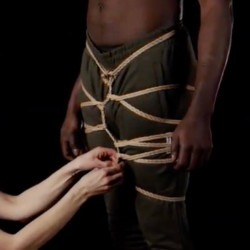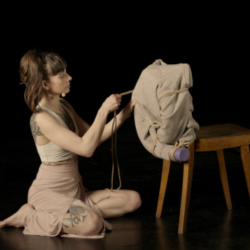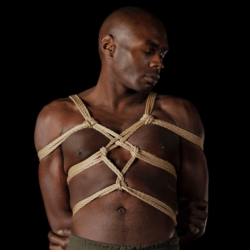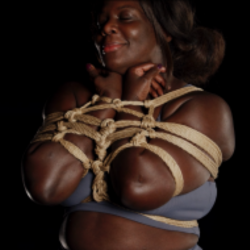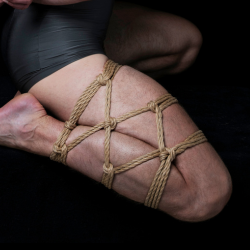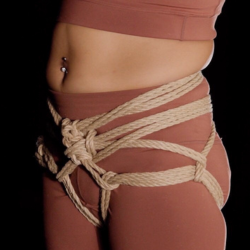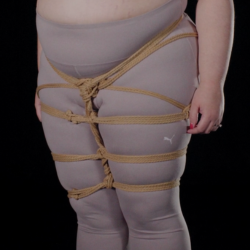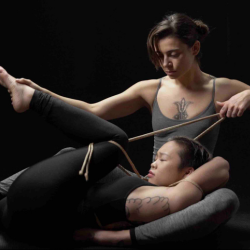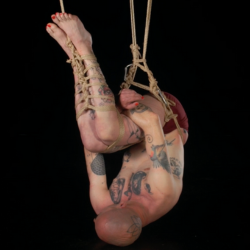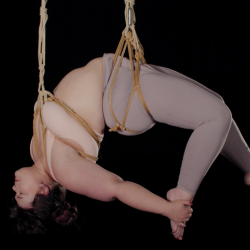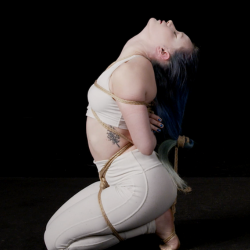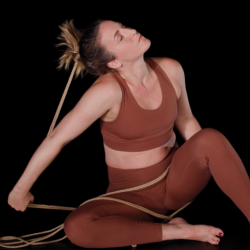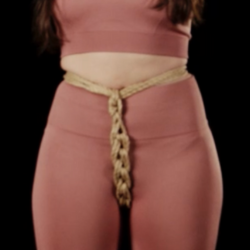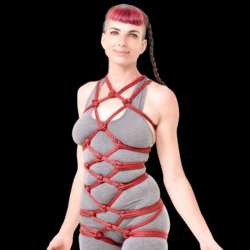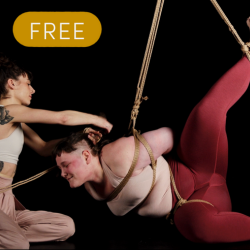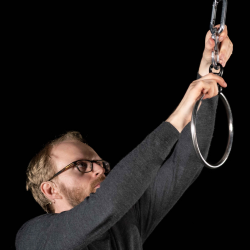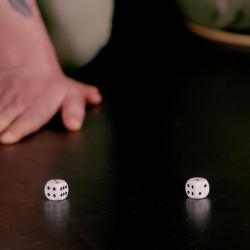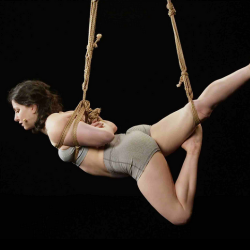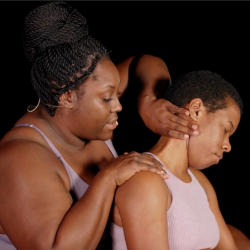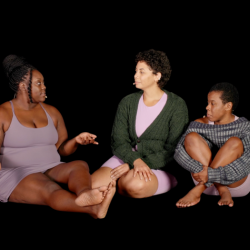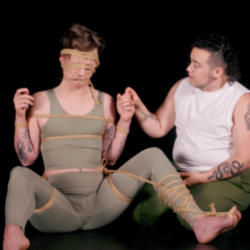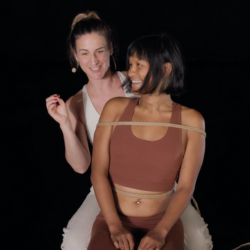EP 03
MS. REEMAH
In this episode, Wren and Ms. Reemah dive into the intersections of kink, psychology and trauma.

Ms. Reemah is an Atlanta-based queer Black Domme, rigger and rope bondage educator who says that rope is her love language. She’s been active in the kink community since 2017.
Wicked Wren [00:00:21] Welcome to the Shibari Study podcast. I'm your host, Wicked Wren. I'm convinced Ms. Reemah Is involved in everything under the sun. She's a member...
Ms. Reemah [00:00:33] (Laughing) It's a lot.
Wicked Wren [00:00:33] You're a member of The Sisterhood of Black Fem Doms in Atlanta, Georgia. You're an organizer for Rope Bite Atlanta. You're a rope track coordinator for Southeast Leather Fest. And you're, just saying, you hold degrees in psychology, clinical mental health counseling and business administration. And you're currently a board-certified therapist and you're working on your doctorate.
Ms. Reemah [00:00:56] I am. While traveling the country, trying to make sure that we're representative of POCs also in rope. Yeah.
Wicked Wren [00:01:03] Where did this hunger for learning come from?
Ms. Reemah [00:01:07] I wanted to understand how people, like why people do what they do or like. How come people from different backgrounds go through different, like come out differently, right?
Wicked Wren [00:01:19] Yeah .
Ms. Reemah [00:01:20] Because I have my own, like quite a bit of trauma. And then even just realizing that a lot of other POCs, you know, in general have a lot of trauma. But we're not working through it. We're not talking about it. I've actually had some conversations and I may do a seminar about it. About how in the black family in particular, mental health isn't a thing, and I'm not doing it as well. Mental health. What. My parents not knowing what psychology was. They said you're majoring in what..? You're going to get a Ph.D.? What's a Ph.D.? It was like, Well, you're not getting an M.D. failure. And it was just like, no, Ph.D. is where I want to go. Because there's so much research that hasn't been done within my community. There's a lack of awareness within the community. And just seeing because I've worked with kids, I used to be a child investigator for child abuse and the crimes against children, and I worked with older adults, I worked with young adults and being able to track it through the lifespan and just seeing how trauma comes up, which is untreated mental health and how that impacts the person in the long run. It's like, damn, we got to do something. I'm not one to sit and say, This is a problem. This is a problem. We do nothing and still sit on my (…). I'm like, This is a problem. Hey fam, what can we do to fix this?
Wicked Wren [00:02:41] You spoke about family earlier. I know that your dad's a traditional Nigerian, and when he came to your house, he saw your pole in your living room and your mom asked...
Ms. Reemah [00:02:51] Oh my goodness.
Ms. Reemah [00:02:52] Why you don't have a dining table? And you said, Because I have a rope rig.
Ms. Reemah [00:02:56] Yes. So in my old apartment, when you walk through the door, large pink pole in the middle. And then you walk into the kitchen, it was like Thanksgiving and I had cooked. And you walk into the kitchen, you have the kitchen to the right, and you had my rig to the left. My mom saw me for years. You don't want a dining room table. I have such a nice one. I could build one for you. And I was just like, No, I'm a (inaudible). She was like in your dining room? And I was like, Mom, you know what's in my dining room and I'm not moving it. So he comes in and he's like, Ah-ah, this table is nice so what is this? And he hangs on and he's there because he's about my size, maybe a little bit bigger. He hangs on it and swings, Oh, this is good. And he's like, What? What do you use it for? And I started laughing and I looked at Mom and I said, I hang people on there. And he's like, Ah, what did she mean by that? So I was like, Oh, Dad, you need to mind your (…) business. We came to get the food and you asking so many questions and I was like, Hello, don't ask questions you don't want answers to. Because I'm going to tell you. And he was confused, don't ask no more questions.
Wicked Wren [00:04:05] Was there ever a time where you didn't feel like you could be your full self in front of your family?
Ms. Reemah [00:04:12] Uh. Yeah. Coming out was, it wasn't a problem, it was a process. Because I'm close to my sisters, I told them first and they'll say, Sure, whatever. And even though Mon was like the first one, she took me to my first (inaudible) in middle school and high school. She ain't even know. She was like, I had to go see my friends and you all are coming. It's gonna to be great. And we're like, What is this?
Wicked Wren [00:04:45] Yeah.
Ms. Reemah [00:04:45] And it was like, This is great. This is so much fun. We're like in a (inaudible). It was amazing. But still knowing our traditions with mom being southern, Dad, being Nigerian is like, Oh, this is not really a thing. And we just got over this big thing of me changing my career to mental health. So it was like, Damn. So I decided to pick the year that it was Mother's Day and her birthday on the same day and was like, Oh, this is perfect. I've got to come out. Not only that, you're going to meet my girlfriend in a few hours.
Wicked Wren [00:05:23] I love it.
Ms. Reemah [00:05:25] So now on Mother's Day, I'm like, Hey mom, can I tell you something? She's like, Ah, (…). But there were some kickback of me just coming out. Like some family members were really upset for whatever reason. Unfortunately, there was like, some aunts who was upset because I was always around their kids. I thought that was the weirdest and most hurtful thing because it's like, gay is not contagious. But what the (…) does that have to do with anything?
Wicked Wren [00:05:58] Yep.
Ms. Reemah [00:05:58] What does that have to do with anything? But it's just like, okay, well, that's your discomfort because I'm gonna keep on. I'm gonna keep on because I'm happy. And then I started getting into (…) and delivering rope to my mom's house, and she was like, Why the hell you got a box full of rope. And she just looked at the rope and looked at me and I just smiled. And she was like, Ooh, my kids are into some interesting things. And I say, Yeah, just let me know when you're ready.
Wicked Wren [00:06:26] And this is about like 2017, right?
Ms. Reemah [00:06:31] Yes.
Wicked Wren [00:06:32] When you started your (…) journey, you wrote I am brand spanking new to (…) life. I did not have a role because I'm not sure where I fall. However, what and who a dom represents deeply resonates with how I operate and wish to function in relationships.
Ms. Reemah [00:06:46] Oh, you went way back.
Wicked Wren [00:06:47] Well, that's so striking to me because in (…) there's so much ego and that statement has so much humility in it.
Ms. Reemah [00:06:55] Yeah, that's what I've been told by my submissive. We've been together since 2019, and he says all the time, You're so respectful. You're so considerate. You treat me like a person. Even though, we have this master-slave owner property dynamic, I just always find that interesting. Maybe that's how I came up, like I was trained by the elders of Black doms of Atlanta, who's been in the community 20-30 years, and now they're in their 50-60s. So. That's pretty much who I was raised by. So it's like at the end of the day but also that mental health component you're still a whole person.
Wicked Wren [00:07:39] Yeah.
Ms. Reemah [00:07:39] Regardless of what road you take, you still have autonomy. I'm still not going to come out disrespectful unless I say in my negotiations. Unless that's something you want. Like that's a big part but also someone who has trauma in addition to the training is like, I don't want to be triggering. I don't want to perpetuate anything that looks like trauma or abuse. So I like to be very cognizant of that.
Wicked Wren [00:08:03] You've spoken about having trauma come up with different submissives and things.
Wicked Wren [00:08:08] Yeah.
Wicked Wren [00:08:09] What do you do when something's not going right in a scene or as planned?
Ms. Reemah [00:08:16] Uhm, I check in throughout my entire scene. Regardless of what I'm doing, I'm always asking, How are you feeling? Are you okay? And getting my partners to realize it's not just a physical feeling. Like if we're doing well, I'm not just talking about those wraps on your arms. Like, where are you mentally? Are you still here? Present with me? Because I did do it in passing with someone and she had a history of physical abuse and domestic violence in a relationship. And one of the toys, one of the leather toys reminded her of a belt. So she was triggered from that. It took her back and it was just like, where are you? I feel like I'm sitting in the corner. I'm trying to hide. And it was like, okay, let's stop and like just work on some grounding. Like, you're here with me, you're here with your sister, you're in my living room, open your eyes and just kind of reorient. But we immediately in the same. Even I think ourselves, my partner had just got overstimulated with like the sounds and whole lot of people. Because we don't do a lot of public play. So it was just like, let's stop. And I try to encourage them like I need you to red when you need to call red. If you are feeling overwhelmed or it's too much, it's okay to call red. Because I know you're amazing. You're strong. It's okay. It's not a reflection of you. Actually, you calling red are our limits is strength in itself. I care about my people.
Wicked Wren [00:09:45] Yeah.
Ms. Reemah [00:09:45] I just care about my people.
Wicked Wren [00:09:48] It's so strongly ingrained in bottoms to be strong and –
Ms. Reemah [00:09:52] Push through.
Wicked Wren [00:09:53] So how did that experience change maybe your intake process or maybe you know how you're starting relationships with submissives?
Ms. Reemah [00:10:02] Oh, I ask about traumas. I asked about mental health. In our relationship romantic (…) don't matter. I ask about trauma and then I describe my definition of trauma because apparently people think it's like a big thing. And I'm like, no, anything negative that happens to you that sticks with you for a long period of time, that's just trauma.
Wicked Wren [00:10:22] Yeah.
Ms. Reemah [00:10:22] If you can think about something that still comes up today that happened when you were seven that's trauma.
Wicked Wren [00:10:27] Yeah.
Ms. Reemah [00:10:27] Or it could have happened yesterday. That was it could be trauma. I ask about trauma. I ask about triggers cause I am a (…). I tend to play a heavy risky type of (…). So it's like if we do something, how would you feel and going to depth as to what that looks like. And I go through the line of some of the common things I like. If we do hair rope, if we do neck rope. I have one partner and she's like, Absolutely not. We're not doing neck rope. You're not going to hang me. I say, You know what? I feel that because that's how I feel about the color of my rope. So cool. And we even have conversations about that. I ask about mental health diagnoses or anything that they feel they struggle with emotionally or mentally. And I like to go pretty in-depth during my check-in. Regular stressors, even before we start tying. What's your stress looking like? I feel like it's more personal. Like it's past just top and bottom dom. It's like, Hey, we're people coming together about to do this thing. Let's just make sure as individuals we're all right.
Wicked Wren [00:11:35] It's so fascinating to hear those through the lens of being a therapist and having all the background that you have. I read that when you got into (…), you had a partner that asked you to slap her, and you did and you liked it. So you went to therapy and asked the therapist. And the therapist was like, that's (…).
Ms. Reemah [00:11:55] Yeah.
Wicked Wren [00:11:56] I feel like that's a missing link in (…) in general.
Ms. Reemah [00:12:01] Yeah, unfortunately, I feel like people are not even replacing (…) with therapy because there was no therapy in the first place. But they're using (…) as therapy, and I think that's strongly misguided. It can be used in conjunction with therapy or supplements. But also it's like if you're not going to have these open conversations with your therapist so what you're engaging in is kind of, What are we doing? What? There's been false information out there about, Oh, I can help heal your trauma through well... And it's just like, What's your license? What's your education? How are you, how are you going to try and just help me understand it? How the hell are you doing it? If somebody could explain because I need answers.
Wicked Wren [00:12:54] Can you talk about some things that people can maybe be aware of that they weren't aware of? Because I feel like a lot of the times people don't do these things on purpose. They're just doing them because they think that they can help but in actuality, they are not.
Ms. Reemah [00:13:09] I was a mediator for quite a few of these instances of the submissive or the dom telling the submissive that they know what's best for them. They don't have a voice, they can't speak, they can't tell what's actually going on with them and is detrimental for the submissive or bottom. And my perspective is it should always be collaborative. What is the negotiation process look like? How do you actually know that everyone's been satisfied and fulfilled? If everyone involved doesn't have a voice. And if you're engaging in something that is detrimental to their mental health, you need to stop that (…). Just stop it. Okay, you may like it. Maybe you need to get another partner who's into that (…) too. But with this person, you need to stop. Not force down or try to coerce them or persuade them to do it. Just, just stop. It's okay to stop. If you care about a person, stop. If you don't, to get out of (…) because something's wrong there.
Wicked Wren [00:14:09] Yeah.
Ms. Reemah [00:14:10] I feel like the foundation, the foundational basis of (…) is communication and consent. And I think that's the part that gets lost.
Wicked Wren [00:14:19] I feel like it's even lost in teaching. A lot of teachers will criticize rather than encourage, you know, and it's feeding their ego rather than actually helping.
Ms. Reemah [00:14:31] Yes. I mean, ego in the rope community is like, I need to simmer down. Okay. Simmer down. I've had people in my class that were like, Oh, you're first person to actually ask your bottom questions and have them speak up. And I'm like, See, that's still the damn problem. My classes are bottom-focused. How am I going to know what to do if I'm not asking my partner what's going on? What they need.
Wicked Wren [00:14:56] What do you think is missing from rope education?
Ms. Reemah [00:15:02] Bottoms. Like speaking up and I don't know what it is, and it's not because my partner is like, No, I don't want to do a class by myself. It's like, Okay, okay.
Wicked Wren [00:15:11] Yeah.
Wicked Wren [00:15:11] Well, let's sit down. Let's create a class because you're going to have a designated part. I'm not talking the whole time. So if we teach this concept, what are some things you feel like will be helpful for both tops and bottoms to know? Bringing them in and making them part of the actual development of these classes and then having them speak. I'm not gonna teach a whole class and my bottom is not talking or giving any type of feedback. Because how are other people going to know. They just want to get into that thing and find out. I mean, we do prevent so much trauma and prevent injuries. If we become more bottom-focused because. Because it's happening to them. So in a way, what are we doing to protect them?
Wicked Wren [00:15:54] I really love how you said trauma before the physical injury because I find that that's the easiest thing to get.
Ms. Reemah [00:16:01] Right. And I tell people and they're like, Oh, do you want another submissive, is like and I'm like, Uh-uh, I don't want the additional responsibility. Because I have to go to class and take care of my partner. So I already have.
Wicked Wren [00:16:14] Others say I know that you take it very seriously. You have your submissive serve your friends and your family and...
Ms. Reemah [00:16:21] Yes. Yeah, it's... I'm very family-oriented. I mean, even my poly style is kitchen table. We actually have a family. My key partners, romantic partners, we all go out to eat once a month and just kick it and chill. That's important to me. It's like community. Like that's community to me.
Wicked Wren [00:16:42] And you've had to actively build that community, correct?
Ms. Reemah [00:16:46] Yeah. And even when people ask, Well, how can I get more POCs. It's like you have to do active outreach. You actually have to message people, call people, walk up to someone and just say, Hey, I'm Reemah, what's your name? How are you? That (…) you've done, what's cool. Or What happened this March, would you like to come? We would love to see you. Like I should be an inclusive, but even specifically for my family, I do interviews, I do questionnaires, background checks, like I'm asking people about you. I'm checking that, I need references that I actually can contact, if I can get in contact like a job.
Wicked Wren [00:17:33] Yeah.
Ms. Reemah [00:17:33] No references, did not respond within 48 hours, we're not gonna be able to move forward.
Wicked Wren [00:17:38] Yeah. If your friends don't know about these people, then there's probably a reason. Or they're very, very new. And if they're not being honest about being very new, then that's a red flag.
Ms. Reemah [00:17:48] We have no problem with new people. It's like, Okay, well let's get on some education and I tell them all the time, I'm like, Listen, education, that's how we service our community because coming out of Covid, a whole lot of (…) is popping off. Like consent violations, just people out here doing unsafe things because they had a lack of education for like two years. So it's like, yeah, what's going on here? That's our service.
Wicked Wren [00:18:19] You said something that was really amazing to me and you said that you added Ms. to your name to add presence to yourself and that it's really hard for you in the beginning to be served because you're so independent.
Ms. Reemah [00:18:38] Ohhhh, where did you do find that? Yes, I was struggling. Oh, my God. Uhm, so I'm the oldest of six. Again, traditional Nigerian and Southern, so I'm in a position where I'm always taking care of everyone else. Even as a therapist, the focus is the clients. Take care of other people. So for, like, the first two years, I was struggling with actually being served because I would just do things myself. And they're like, Ma'am, that's what I'm here for. And it's like to do what?
Wicked Wren [00:19:16] You're just like, I'm fine.
Ms. Reemah [00:19:20] Yeah. And it was like I had to redefine, reconceptualize where I feel like service is. And it was like anything to make your life easier. And that's my definition. It was like, Oh, well, I need you to go to the store for me.
Wicked Wren [00:19:33] I love that.
Ms. Reemah [00:19:33] Oh, okay, this is great. I need to do to wash the dishes. And then it was like anything, and it just became more comfortable and actually helps take stress off me. Even my submissive, he was like, I want to help decrease your stress. What can I do to help with that? And I was just like, Oh, well, there's quite a few things you could do. Now that I think about it. It was like redefining those things. We put it into terms of stress and help when as opposed to something that is removing my independence or challenging my ability to be self-sufficient. That's not what's happening. I know everybody. My momma knows I could do this (…). But it would be easier if I had help and this kind of just in general, like if I had additional help with support, I feel like with most people, things would be easier.
Wicked Wren [00:20:27] And the only reason that happened is because you're open to communication with your bottom.
Ms. Reemah [00:20:32] Yeah. So then when I had it, he was like, Why won't you let me help you? And I'm like, What? Damn.
Wicked Wren [00:20:36] Yeah.
Ms. Reemah [00:20:42] Why? Help me do what?
Wicked Wren [00:20:43] You're like, I got it. I'm good to go, babe. I don't need this.
Ms. Reemah [00:20:47] Yeah.
Wicked Wren [00:20:48] Well, Ms. Reemah, you're amazing. I love talking to you. I learned so much. You're currently working on your doctorate, correct?
Ms. Reemah [00:20:57] I am. Yes, 2024. I just did like the preliminary stuff of kind of getting the intro to what I want to do. And I was so happy that it was well accepted. Oh, my gosh. I remember sitting in my interview and I'm just like, I'm only studying queer people. I'm not flexible on that. That's a non-negotiable. And they were saying, they're looking at me like someone's mouth dropped. And someone was like, Well, how would you have access to that population? I said I am queer. So everyone I know, yeah, that is not the hard part for me. I say, honestly, the hard part is finding those who is not into (…) and identify as heterosexual. That's the difficult part. That's what I need y'all to help me with.
Wicked Wren [00:21:45] Well, I'm sure there's no research like that out in the world.
Ms. Reemah [00:21:48] And which is why I want to do it. Because there's so much misinformation. But like actual empirical-based research? No.
Wicked Wren [00:21:57] Where do people find you?
Ms. Reemah [00:22:00] Instagram is the one I check most frequently. Leoreemah. I check FL periodically, Ms. Reemah. And then my email is leoreemah@gmail.com And that's it. I check that often.
Wicked Wren [00:22:15] Well, I want to thank you again for being on and talking here.
Ms. Reemah [00:22:20] Thank you for having me.
Wicked Wren [00:22:22] Oh, my God. You're so welcome.
Ms. Reemah [00:22:24] I appreciate it.
Start your free 7-day trial
Get one free week of unlimited access at Shibari Study,
then pay from $17.90/month. Cancel anytime.


